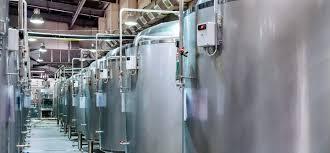How Has GWT Wastewater Filtration Systems assisted Industrial Companies to Reduce Cost and Reuse Their Wastewater?

This article will summarize some cases studies in which Genesis Water Technologies, Inc. (GWT) has previously aided some of our industrial clients in different industries in reducing their operating costs through wastewater treatment and reuse. Each of these applications made use of some of GWT’s wastewater filtration systems to maximize pollutant removal.
Power Generation Boiler Feed water
Power generation facilities use particularly large volumes of water for a number of processes to ensure the facility operates in a safe and efficient way. One way they use water is in cooling towers that keep generators from overheating. On the opposite end of the spectrum, water is also heated in boilers to produce steam that powers turbines which in turn produce energy. These boilers can be temperamental though, and using water that contains impurities can drastically reduce the efficiency of these systems and some can outright damage them if not properly monitored and treated.
It is a goal of many power generation facilities to recycle water that they use so that they can operate more sustainably while also reducing operating costs. To do so, an effective decentralized treatment system is the way to go. One such facility consulted GWT for a system that would meet their specified requirements for operation. The influent feed water contained troublesome contaminants like hardness minerals, dissolved salts, trace hydrocarbons, and a few heavy metals such as ferric iron.
GWT designed, engineered, built, and supplied the system and a local civil engineering and construction partner installed it with technical assistance from GWT. The system utilized reverse osmosis to remove the dissolved salts, but before this process, contaminants were taken care of using specialized GWT wastewater filtration systems that included both zeolite and carbon filtration coupled systems with a scale prevention system to ensure optimal feed water quality for the operation of the RO system.
Since installation, the treatment system has operated within the design specifications to provide high-quality feed water to their boiler with an added benefit of lower operating and maintenance costs.
Pulp and Paper
Of the large quantities of water that are used during paper making, it is estimated that 80 to 85% of it is used as process water, meaning it is used directly in pulp/paper production. Creating the pulp, in particular, uses a sizable chunk of that. When the paper itself is being made, that water within the pulp is strained out. This leaves the resulting water filled with a number of contaminants that need to be treated before discharge or reuse. Of course, for matters of reuse, it is easier and more cost effective to treat wash water.
As such, a mid-size company that produced tissues and paper towels wanted to reuse their wash water to reduce the cost of water consumption and to comply with environmental regulations. The wastewater in question contained high levels of BOD, COD, turbidity, and suspended solids. GWT was consulted on the process design and an optimized treatment system was engineered that would meet the stipulations provided by the client. The supplied pilot system consisted of specialized screen filtration that preceded a GWT electrocoagulation unit which was followed by a dissolved air flotation unit that operated without any polymer introduction. The treatment concluded with a post-filtration polishing system before reuse.
The system reduced BOD levels by 90%, COD by 84%, turbidity by 92%, and 99% reduction of suspended solids thanks to the two wastewater filtration systems. The quality of the treated wastewater makes it usable in production, cooling towers, and other non-potable applications onsite.
While paint and pigment production facilities use water in their production of products, most of their wastewater comes from cleaning out the numerous machines and equipment that manufacture water-based paints, solvent-based paints and resins. This equipment includes mixers, thinning tanks, and tinting and filling machines, which are cleaned frequently. Sometimes when treating wastewater from these applications, large volumes of sludge can be generated leading to substantial discharge costs on top of other associated costs to maintain compliance.
A company that produced organic paints and pigment coatings for cars and other commercial applications faced a similar situation. They already had a chemical coagulation/flocculation based treatment system, but found that the sludge produced garnered significant discharge costs. They sought to lower the volume of sludge produced with a more sustainable solution that could still meet their discharge requirements. Their wastewater was composed of pollutants such as volatile organic compounds, color, suspended solids, BOD and COD.
GWT and its local partner proposed a solution that removed the coarse organic solids by pumping the raw influent from a primary holding tank through a pre screen filter. The chemical coagulation was exchanged with a GWT electrocoagulation system followed by clarification with the aid of GWT Zeoturb bio-organic flocculant medium. The final tertiary wastewater filtration system process removed the remaining color and particulates by use of a micro filtration unit.
The system witnessed a 97% reduction of COD based on third party lab tests, supplemented by a 70% reduction in discharge costs. The client was also able to reuse the treated water in washing applications and cooling towers to further reduce operating costs.
Wondering how a GWT wastewater filtration system could help your organization to reduce your treatment costs and reuse your wastewater? Call the water treatment experts at Genesis Water Technologies, Inc. at 1-877-267-3699 or reach out to us via email at customersupport@genesiswatertech.com for a free initial consultation to discuss your application.

